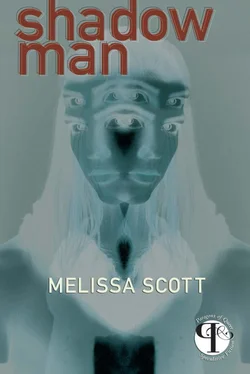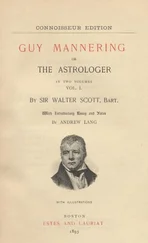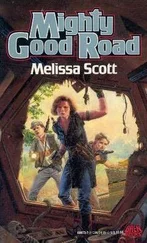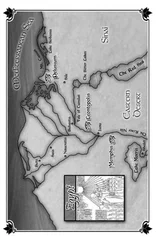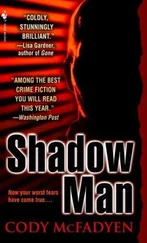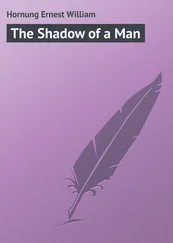“I know that,” Temelathe answered, and visibly bit back something more. After a moment, he said, “I’m not happy with this contract, my son. Not at the price you’re getting for it. I can’t afford it. I’m not going to make it easy for you.”
“I didn’t expect you would,” Warreven said. “With your permission, my father?”
Temelathe waved a hand. “Put another scoop on the fire, my son, as a favor, and you’re free to go.”
Warreven did as the older man asked, ladling out another measure of the donnetoil and pouring it carefully onto the embers. Smoke billowed out more vigorously this time; he left Temelathe sitting in its cloud and made his way back out into the hallway.
It was quiet, quieter than he’d expected, no noises, none of the household faitou s anywhere in sight, and he hesitated, startled by the silence. The air smelled of the night breeze, sea and salt and the night-blooming starshade; he looked around for the open window and instead saw the curtains that hid the garden doors moving in the fragrant air.
“Raven?” Tendlathe pushed the curtain aside, stood framed in the doorway. “Aldess said you were here. I’m glad I caught you.”
Warreven hesitated again, searching hastily for an excuse—he was hardly in the mood for a conversation with Tendlathe—and the other managed a rueful smile.
“Look, I’m sorry about last time. I got carried away—it’s something I feel strongly about.”
“So do I,” Warreven said. “I—feel strongly—about a lot of things, too.”
“I know.” Tendlathe glanced over his shoulder. “I got your message, and—look, we can’t talk here. Come out in the garden with me?”
“Ten—” Warreven broke off, shaking his head. I don’t want to talk to you because I think you caused a man’s death, and I’ve just come from his memore : it was not a tactful comment, and at the best of times Tendlathe wasn’t likely to respond well. And this was hardly the best of times.
“It’s important,” Tendlathe said. “Please?”
Warreven sighed. If Tendlathe was in a conciliatory mood— and he had to be, or he wouldn’t bother being polite—it was worth swallowing his own anger to meet him halfway. “All right,” he said aloud, and Tendlathe held aside the curtain. Warreven stopped under the hanging fabric, the silk gauze just brushing his head, and only then thought to wonder at the gesture. It was courtesy, certainly, but from a man to a woman, not between two men. He was being oversensitive—not surprising, after the events of the evening, but hardly useful. He shook himself, walked on down the path that curved away from the house. The light dimmed a little as Tendlathe came to join him, letting the curtain fall back into place. The low hedge that separated the upper terrace from the flower walk below was wound with starshade, the white flowers, large as a man’s hand, almost luminous in the darkness. Their scent was heavy in the air, the honeyed sweetness almost drowning the smell of the sea.
“I know what you’re thinking, Raven,” Tendlathe said, “but I didn’t do it.”
Warreven glanced back at him, eyebrows rising in unspoken question, and Tendlathe made a face.
“I didn’t kill Lammasin. I swear to you by the Captain, by the Watch and the clan, I didn’t do it.”
“I never thought you did it,” Warreven said, after a moment, and saw something, relief, maybe, or possibly contempt, start to cross the other’s face. “I never thought you stabbed him, or knocked him over the head, we don’t know which yet, and then set the fire. Not personally. But I do think you know who did it, and I think you’re responsible.”
“That’s not fair.”
“Isn’t it?” The light from the house was falling across Tendlathe’s face, throwing half of it into shadow, striking a fugitive spark from the pin, anchor and flames, that closed his plain collar. Warreven watched him, an odd, clinical anger filling him. It was the same anger that sometimes consumed him in the courts, giving passion to his arguments, and he welcomed it, welcomed the power, the strength it brought him. “And would you swear to that, by the Captain, on Watch and clan, that you had no idea this would happen?”
Tendlathe opened his mouth, closed it again, and said at last, “Someone overstepped himself.”
“What’d you have in mind, just beat him up, teach him a lesson?”
“Not exactly.” Tendlathe glared at him. “But people are angry, Raven, angry and scared, and you might’ve known some- thing like this would happen if you kept pushing things.”
“Me?”
“You, Haliday, the rest of the Modernists.”
Warreven laughed.
“God and the spirits!” Tendlathe reached out blindly, snatched a flower and a spray of leaves from the hedge, let them fall, crumpled, to the stones of the terrace.
“Oh, that’s very helpful,” Warreven said. He didn’t think to be afraid until he saw Tendlathe’s fist rise. He ducked, the reflexes honed in a dozen bar fights taking over, caught the other’s wrist, forcing his hand down. He could feel the bones shift under his fingers, saw Tendlathe flinch, rage vanishing as quickly as it had appeared, didn’t release his grasp until he felt the tension disappear from the other’s arm. Tendlathe jerked himself free, swearing, and they stood facing each other in the dark, each a mirror image of the other. They had fought like this once before, years ago, over the marriage. Warreven remembered with painful, physical clarity how it had ended, himself finally astride Tendlathe, pinning him down, one hand in the tangle of his hair. They had lain there for a long instant, anger warring with unexpected, unwelcome desire, and then Warreven had pulled free and stalked away. He had thought he had won, until he felt the next morning’s bruises and started to face the consequences of his decision.
He could see the same memory in Tendlathe’s face, the color high on his cheeks, visible even in the dim light. Warreven took a deep breath, not wanting this to end the same way, and said flatly, “So what did you want, Tendlathe?”
Tendlathe blinked, head lifting, a little movement, but it was as if he’d been slapped. Something, regret, shame, anger, was briefly visible in his face, and then it was gone, his expression con- trolled again, shuttered, all emotion suppressed. “I was going to offer you a deal. Drop this case—I don’t want Father to bring in the off-worlders, let them get their hands in our government— drop this case, and I’ll see that those women of yours are left alone.”
“Women?” For a moment, Warreven didn’t understand, then remembered the marketwomen outside the Blue Watch House. If the ghost ranas or even the mosstaas turned on them, they would have no way of defending themselves. Even if Folhare and Haliday had managed to talk their ranas, the Modernist ranas, into offering protection, it might not be enough, not against the ghost ranas— And then they would have to wait for another case, another chance, to question Hara’s laws, to bring them into line with the Concord—with reality—never mind what it would do to Destany and ’Aukai. “You bastard,” he said, almost conversationally, and turned, and walked back up the path toward the house.
“You’ll regret this, Raven. I promise you.”
Warreven lifted a hand, jerked it upward, an ageless, universal gesture, but kept walking. He might have won—though, like the last time, he’d have to wait until morning to be sure—but he didn’t like the potential cost.
Wrangwys : (Hara) literally, “wrong way,” generally used to refer to herms, mems, and fems, and anyone whose sexual preferences don’t match the male/ female model; has been adopted by that group as a self-referential term, and is not insulting within the group.
Читать дальше
